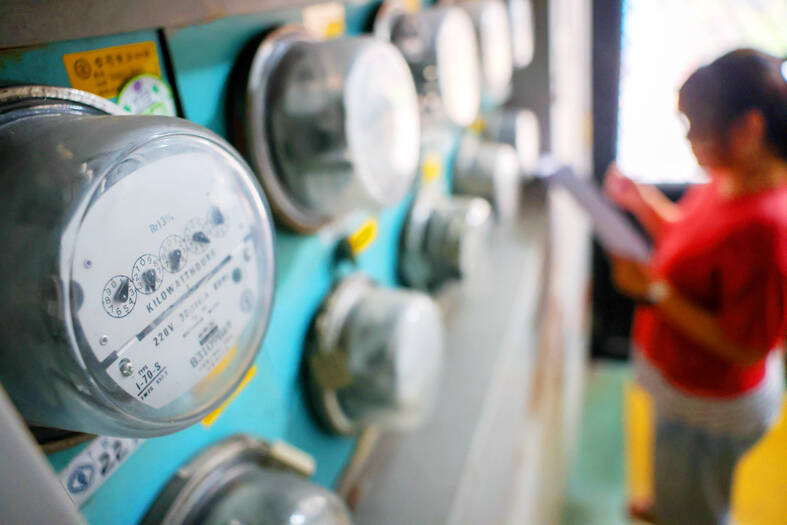An internal report of state-owned Taiwan Power Co (Taipower, 台電) showed that the company is seeking government approval to raise electricity rates by almost 6 percent on average to make up for huge losses.
The Ministry of Economic Affairs would next week hold a power rate assessment review meeting to discuss whether Taipower would be allowed to hike electricity rates next month.
The state-run company has shouldered NT$422.9 billion (US$12.82 billion) in accumulated losses.

Photo: CNA
To prevent further losses, the company needs to generate an additional NT$50 billion in revenue this year through electricity rate hikes, Taipower said.
Its report showed that rates for household users and small businesses, which consume less than 330 kilowatt-hours (kWh) a month, would be raised by 11 to 33 percent.
Bills for household users and small businesses that consume more than 330kWh a month would rise no more than 10 percent under a progressive tariff mechanism, the report showed.
Rates for the industrial sector are expected to be raised no more than 5 percent, it said.
The measures would bring average rate hikes to almost 6 percent as a whole, it said.
Taipower considered rate increases after the Legislative Yuan cut the general government budget plan, including two NT$100 billion subsidy projects for the power company, as well as other subsidies that would be added to its construction funds for outlying islands, the utility said.
Earlier this week, Minister of Economic Affairs J.W. Kuo (郭智輝) said the ministry would account for the rate hikes effects on inflation, adding that the government is determined to keep the local consumer price index (CPI) from rising more than 2 percent, an alert level set by the central bank.
In the first two months of this year, the CPI grew 2.12 percent, while the Directorate-General of Budget, Accounting and Statistics late last month forecast that inflation would reach 1.94 percent this year.
The rate hikes aim to allow the power supplier to sell electricity at a price closer to its costs, the Taipower report said.
Taipower chairman Tseng Wen-sheng (曾文生) had said he hoped the local electricity rate structure would be more reasonable, particularly for smaller households and business users.
If the rate hike plan is approved in the Ministry of Economic Affairs’ power rate review meeting, about 13.6 million households and 910,000 small businesses would be affected, Taipower said.
The rates for industrial users, regardless of whether they are high-voltage users such as contract chipmaker Taiwan Semiconductor Manufacturing Co (台積電) or other companies, are expected to rise, it added.
Despite the electricity rate increases, it is unlikely that the company would break even this year, as it has to consider the effect of inflation on household users and the competitiveness of Taiwan’s industries, it said.

Right-wing political scientist Laura Fernandez on Sunday won Costa Rica’s presidential election by a landslide, after promising to crack down on rising violence linked to the cocaine trade. Fernandez’s nearest rival, economist Alvaro Ramos, conceded defeat as results showed the ruling party far exceeding the threshold of 40 percent needed to avoid a runoff. With 94 percent of polling stations counted, the political heir of outgoing Costa Rican President Rodrigo Chaves had captured 48.3 percent of the vote compared with Ramos’ 33.4 percent, the Supreme Electoral Tribunal said. As soon as the first results were announced, members of Fernandez’s Sovereign People’s Party

MORE RESPONSIBILITY: Draftees would be expected to fight alongside professional soldiers, likely requiring the transformation of some training brigades into combat units The armed forces are to start incorporating new conscripts into combined arms brigades this year to enhance combat readiness, the Executive Yuan’s latest policy report said. The new policy would affect Taiwanese men entering the military for their compulsory service, which was extended to one year under reforms by then-president Tsai Ing-wen (蔡英文) in 2022. The conscripts would be trained to operate machine guns, uncrewed aerial vehicles, anti-tank guided missile launchers and Stinger air defense systems, the report said, adding that the basic training would be lengthened to eight weeks. After basic training, conscripts would be sorted into infantry battalions that would take

GROWING AMBITIONS: The scale and tempo of the operations show that the Strait has become the core theater for China to expand its security interests, the report said Chinese military aircraft incursions around Taiwan have surged nearly 15-fold over the past five years, according to a report released yesterday by the Democratic Progressive Party’s (DPP) Department of China Affairs. Sorties in the Taiwan Strait were previously irregular, totaling 380 in 2020, but have since evolved into routine operations, the report showed. “This demonstrates that the Taiwan Strait has become both the starting point and testing ground for Beijing’s expansionist ambitions,” it said. Driven by military expansionism, China is systematically pursuing actions aimed at altering the regional “status quo,” the department said, adding that Taiwan represents the most critical link in China’s

EMERGING FIELDS: The Chinese president said that the two countries would explore cooperation in green technology, the digital economy and artificial intelligence Chinese President Xi Jinping (習近平) yesterday called for an “equal and orderly multipolar world” in the face of “unilateral bullying,” in an apparent jab at the US. Xi was speaking during talks in Beijing with Uruguayan President Yamandu Orsi, the first South American leader to visit China since US special forces captured then-Venezuelan president Nicolas Maduro last month — an operation that Beijing condemned as a violation of sovereignty. Orsi follows a slew of leaders to have visited China seeking to boost ties with the world’s second-largest economy to hedge against US President Donald Trump’s increasingly unpredictable administration. “The international situation is fraught